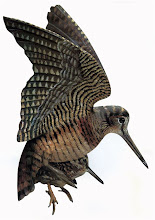RESEARCH
GROUP: Club de Cazadores deBecada (CCB), a team project
STUDY
SPECIES: Eurasian Woodcock
STUDY
LOCATION: Spanish State
BACKGROUND:
In the early 2000s, the smallest PTTs weighed 18g, while the Eurasian Woodcock’s weight is around 300-350g. Most of the information available on the internet about the species was already anaylzed, but at the end of 2004, we knew that MTI was preparing a new Solar 12g PTT. Our first project, in 2006, was very exciting — lots of nights without sleeping, watching our computer and waiting for new data. Really incredible! We were pioneers in Europe at the time, and today there are more related projects in Russia, Scotland, Italy, Great Britain, and the USA.
In the early 2000s, the smallest PTTs weighed 18g, while the Eurasian Woodcock’s weight is around 300-350g. Most of the information available on the internet about the species was already anaylzed, but at the end of 2004, we knew that MTI was preparing a new Solar 12g PTT. Our first project, in 2006, was very exciting — lots of nights without sleeping, watching our computer and waiting for new data. Really incredible! We were pioneers in Europe at the time, and today there are more related projects in Russia, Scotland, Italy, Great Britain, and the USA.
The
Eurasian Woodock is a very unusual bird. The bird flies by night.
During the day, it rests in places where there is not much sunlight,
creating a technological challenge when using Solar PTTs. With the
financial help of different institutions (the Governments of Navarre,
Catalonia, Bizkaia, Majorca, with some banks and the people from
Argos) plus many people (hunters, field people, and more) who helped
us to locate the birds in different places around the whole Spanish
State, from Galicia to Catalonia, from Andalusia to the Basque
Country, we have been able to really understand much more about this
bird’s behavior. In the future, we hope to try using small
SolarArgos/GPS PTTs to track Eurasian Woodcocks.
KEY
RESEARCH QUESTIONS:
• What
is the real migration route of Eurasian Woodcocks?
• How
far do they fly before resting?
• What
is the speed of flight?
• Are
the Ural Mountains their final destination?
• How
do you solve the interference problems around Catalonia?
• Was
the PTTs charge a limiting factor?
APPROACH:
First
we used the Solar 12g PTT (one with an ON/OFF duty cycle of 10/48 and
two with 10/72). Then Solar 9.5g PTTs with a duty cycle of 10/48. MTI
gave us two prototypes, with new solar cells, and a duty cycle of
8/55. Nowadays, we are using Solar 9.5g PTTs with a duty cycle of
10/40. We also developed a special harness to attach the PTT to the
bird.
CLUB
DE CAZADORES DE BECADAS (CCB) is using small Solar PTT models to
track the migrations and behaviors of Eurasian Woodcocks across
Europe.
